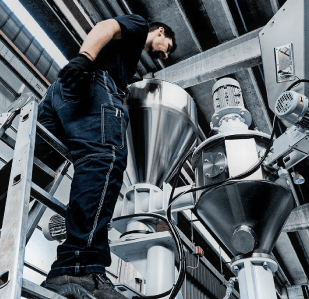In Brief
The world of plastic is constantly evolving, driven by the need to improve performance and properties in a way that takes into account new approaches to sustainability. In this article, we will explore in detail exactly what plastic compounding is, how it works, and what its benefits and applications are.
What is the compounding process and how does it work?
Plastic compounding is an advanced process that involves mixing polymers with additives, fillers, or other chemical substances to improve the properties of the plastic base material. This process typically occurs through the use of specialized machinery known as compounders or extruders.
The main aim is to obtain a consistent blend with the specific characteristics required, such as:
-
resistance
-
durability
-
flexibility
-
thermal properties
The process begins with the selection of a base polymer, which can be polyethylene, polypropylene, PVC, or other plastic materials. This polymer is then combined with additives such as:
Benefits and applications
We are now going to look at the most important benefits and applications of this compound.
-
Improving mechanical properties: compounding makes it possible to optimize the mechanical properties of plastic, such as impact resistance, rigidity, and flexibility. This makes the material suitable for a wide range of applications, from industrial packaging to automobile parts.
-
Controlling thermal characteristics: by adding thermal agents, compounding allows the thermal conductivity of the plastic to be adjusted. This is fundamental in applications where specific thermal management is required, as in electronics or parts exposed to temperature variations.
-
Resistance to atmospheric agents: the addition of UV stabilizers during the compounding gives the plastic greater resistance to atmospheric agents. This is essential for products intended for outdoor use, such as garden furniture or building components.
-
Color and appearance versatility: compounding can obtain a huge range of colors and surface finishes. This is crucial for industries that require aesthetically pleasing products, such as the consumer industry.
-
Reducing production costs: by optimizing the properties of the plastic through compounding, companies can often reduce production costs. For example, a more hard-wearing material may reduce the need to frequently replace parts or products.
Now let's take a look at four of the various applications of plastic compounding:
-
Automotive: compounding is widely used in the production of automobile parts, improving the resistance and durability of parts such as bumpers, interiors, and hoses.
-
Packaging: the customizable properties of plastic obtained through compounding are crucial in the packaging industry, guaranteeing the safety and freshness of the products.
-
Electronics: in the electronics industry, compounding is used to produce materials that can manage the heat generated by devices such as computers and cell phones.
-
Construction: composite materials derived from compounding are widely used in construction to improve the resistance and durability of structural elements.
Discover compounding excellence with Bausano!
If you’re ready to improve the quality of your plastic compounding productions, look no further. Discover Bausano’s compounding machinery and transform your plastic materials with innovation and precision.
The future of plastic is already here!






